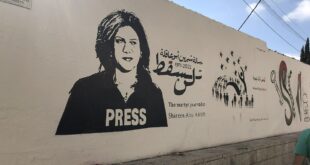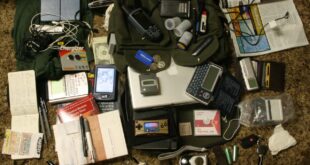(Editor’s Note: This article is one of two personal essays in this issue of TBS, one written by Vivian Salama, a reporter covering the Mubarak campaign, and another written by Usama Najeeb, a staffer working on the media team for that same campaign. Najeeb, a former Adham Center graduate student intern, also serves as assistant editor of TBS.)
In Egypt, the summer of 2005 found the nation’s political parties on the front lines of a battle for reform, as President Hosni Mubarak’s regime, under pressure both at home and abroad to democratize, staged its first ever multi-party presidential elections. Under the blistering late-summer heat, political veterans fired accusations and critiques back and forth, while the opposition struggled to agree on a unified strategy to face the incumbent, a 77-year-old ruler who was going for his fifth, six-year term in office. And of course, as on any major battlefront in this globalized world, there also were the journalists, strategically embedded exactly when and where the government wanted them.
That’s how I spent the summer of 2005—covering the ruling National Democratic Party’s (NDP) bid to get President Hosni Mubarak reelected. Actually, it could hardly be termed a reelection, considering that Mubarak had never before run for office in all his 24 years in power. Before Mubarak’s announcement in February 2005 that he would support amending the constitution to allow more than one candidate to run for president, Egyptians had simply voted yes-or-no in a nationwide referendum every six years. Having only been in Egypt about a year and a half at that point, it was tough not to get swept up in the excitement and the buzz about the possibilities of coming change. Was an Arab Spring dawning? Was I witnessing it unfold?
I knew there were two kinds of journalists in Egypt: government and nongovernmental. Reports by the government-controlled media outlets tended to perform a song-and-dance routine of praise for the man who has ruled Egypt virtually uncontested for nearly a quarter century. Privately-owned and party newspapers tended to do the exact opposite—in recent years, the independent and opposition press had grown bolder, criticizing Mubarak more directly and vocally than ever. As for the ruling party, they were pretty good at photo-ops, but only when dealing with Al Ahram newspaper or Egyptian National Television, whose reporters, I tend to speculate, have rooms in the presidential mansion.
But for foreign media to catch a glimpse of the man behind the curtain, they’d probably have to sacrifice their first born—and this, only if they possessed the exclusive presidential press pass, which is almost as hard to get than an invite to the Oscars. That’s just the way it was, the way it always had been. No one complained and there was little to be done about it. I walked into this story feeling extremely disconnected, knowing the facts on paper, but nothing more. Sure, I have my thoughts on the matter. If you ask me, I’d say 24 years is a long time for anyone anywhere to lead a nation. At the same time, for as many people as I had spoken to prior to the campaign, there were as many who criticized the ruling party as there were those who supported it. I had no reason not to be objective.
It’s fair to say that we were all caught off guard the day we assembled at the new, state-of-the-art campaign headquarters; wallpapered in photos of “commoners” who looked suspiciously like models, each posing exultantly under the campaign’s logo, “Mubarak 2005: Leadership and crossing into the future.” In the background loomed a giant campaign photo of the new, relaxed, open-collared Hosni Mubarak, man of the people. And miracle of miracles, the notoriously un-transparent ruling party’s headquarters even boasted a press room where reporters were served cold beverages, given Internet access and provided with telephones and televisions to carry out their business.
The Golden Ticket
While everyone knew the results of this unprecedented election were predetermined, the hype and novelty of the 19-day campaign period seemed to provide a glimpse of a nation in transition. Through it all, the ruling NDP sought to offer the world a fresh look at a party reforming from within. A major sign of this reform seemed to be manifest in the greater accessibility offered to the media.
In an electoral exercise that the whole world was watching, image counted. Even before Mubarak officially announced his candidacy for the 2005 election, the NDP was hard at work formulating a nonpartisan media and public relations team. Headed by Mohamed Kamal, a young member of the policies secretariat for the NDP who gleaned much of his political exposure through work with the US Congress and European Union, the team aimed to facilitate easy-access, two-way flow of information between the media and the ruling party.
Gone are the days, the party proclaimed, where politicians dodge questions, act aloof and brush off the need for responses. The scheme was simple—a journalist who needed a quote, a response, or any information concerning the NDP would get all he/she needed with a simple phone call. Then came the temporary abolishment of the exclusive presidential press pass, suddenly transforming presidential coverage into a free-for-all.
And talk about accessibility! Members of the NDP campaign team would provide daily press releases, and weekly press conferences to address all issues concerning the campaign and answer reporter questions (with translators on-hand for the foreign press). Every afternoon, some of the junior members of the media team would ring us up with a briefing on the following day’s events. It was a major change for a regime known for its impenetrable lack of transparency. But in some ways, this was just the same-run around, just friendlier and more suave.
“So… we can just call you and get a quote?” I asked Kamal skeptically as he handed me his business card, his mobile number inked on. The next day, he called me to compliment—and criticize—a story I had written for my newspaper, The Daily Star Egypt. One point of contention Kamal had with the story was that I had written that “a request by the Daily Star Egypt to meet with someone on the advertising team was denied.” “I didn’t deny you a meeting with him,” Kamal told me politely. “I went to his office and he was not there.”
“Yes, you certainly did,” I retorted. “But only after refusing my request five times, and ultimately refusing to give me the guy’s name and number.” We barked a bit, laughed a bit, and all was forgotten.
Boys on the Bus
If I ever see the dawn in Egypt again, it will be too soon. Morning after morning, groggy and sleep-deprived, we reporters would drag ourselves to campaign headquarters in predawn Heliopolis to get bused—and in one instance flown—to campaign stops from Assuit to Alexandria and everywhere in between, all the while battling the grueling August heat, long waits, hefty security, and piercing hunger pains. On one occasion, I found myself rationing four peanut butter cookies. The next day, the campaign responded to reporters’ complaints about the long trips without food or drink and supplied bagged meals of cheese sandwiches and juice boxes from the Egyptian fast-food chain Mo’min. But food was not the only handout. Reporters also were offered campaign paraphernalia, be it pins or signs, as they traveled. Many of us accepted them as souvenirs; others wore them, probably just to be on the safe side, as showing support for the ruling party never hurt anyone!
Over the course of the campaign, the system changed slightly during press conferences, where English-speaking journalists were given an exclusive chance to ask their questions following a session with the Arabic-speaking press. My colleagues and I began to speculate. Was it a time management issue? Was it special treatment? Were party officials isolating local journalists from certain subject matters that might have come up with the foreign press? Regardless of the answer, the campaign staff was generous in their time with both groups, though the phrase “off the record” was in far-too-common use.
The “off the record” comments lacked what I call the “wow factor.” They had no substance, they were not of great interest to the public, and they weren’t even that interesting to the journalists, who find almost anything interesting. They were usually sarcastic or snide remarks from the younger members of the campaign, few of whom were actually party members to begin with. Actually, the “off the record” comments were generally no big deal at all, but it was clear the staff was rather jumpy and extremely careful about what they said to the press. Image control was in high gear.
Perhaps the biggest “off the record” get for foreign journalists, however, was an interview with the head of the NDP campaign on the eve of Election Day. Gamal Mubarak, the president’s son, whom many speculate will succeed his elderly father, granted an audience to a handful of reporters, foreigners only. He answered questions that ultimately would remain off record. The meeting, which followed the denial of dozens of requests for interviews with either Gamal or his father by local and foreign media, came as a surprise to all of us who learned of the meeting a mere hour in advance -- several of us arriving without a clue as to why we were even there.
In fact, the role of Gamal was the real untold story of this campaign. I say untold in part because the NDP was obsessively paranoid about anything touching on Mubarak’s politically active elder son, even though it was common knowledge he was running the campaign. At Abdeen Palace, the day President Mubarak gave a speech for the campaign finale, Gamal stood unaccompanied on stage anticipating his father’s arrival. Stunned that he was alone and vulnerable to vulture journalists like myself, I approached the younger Mubarak requesting a statement on the campaign, whereby he politely asked that we save it for after the speech. I nodded appreciatively, interpreting his response as a clear “no.” As I returned to my seat, however, I was intercepted by senior members of the campaign. “That is inappropriate,” one of them said to me, firmly, all the while dragging me away by the arm. “Why?” I snapped, feeling disenfranchised. “It just is,” was the response. There was no question I’d crossed an invisible red line. Despite the new-fangled “American-style” campaign—Kamal once joked with journalist that he’d gotten some ideas for it from watching West Wing on TV—some things clearly had not changed.
My editors say, “You got your story, now get over it.” Discouraging as this final episode was, when asked by anyone my opinion of the campaign, I tell them simply, “It’s a phenomenal step.” It was. Still, while journalists are taught to disconnect in order to remain unbiased, it is difficult not to warm up to any group with whom you spend so much time. And so, as I sat through the hot and sticky speeches at factories or farms or Cairo palaces, the truth is, I wanted to believe that maybe this is a new NDP. I have heard the criticisms over and again from colleagues and friends and taxi drivers alike. I’ve been to the opposition rallies and heard the speeches of those challenging Mubarak. Still it was the NDP I was with day in and day out and so it was natural to warm up to the faces -- at least some -- behind the NDP. It was at Abdeen Palace, the final day of the campaign as the elderly president’s voice echoed across the square while 15,000 supporters bellowed songs and chants promising to sacrifice themselves for Mubarak, that I recall turning to a fellow journalist and saying, with genuine concern, “The president looks tired tonight.”
When you put so much time and effort into something, it is natural to want to believe in it. Besides—old political party turns new, dictator becomes democrat—what a great story that would be. The bottom line is journalists love to speculate. So if there is even a hint of doubt, be it from a string of “off-the-record” comments, or inaccessibility to even one person (especially when that person is Gamal or Mubarak himself), it’s going to raise some questions.
Mohamed Kamal proclaimed prior to the start of the campaign, “We have designed a different kind of campaign for a different kind of election.” I believe the NDP accomplished this—so much so, in fact, that two weeks after the president claimed victory, my colleagues and I covering the NDP convention bemoaned the return to business as usual and admitted we very much missed the organizational tactics and media-savvy of Kamal and his team. They had admitted early on that there would be imperfections on this maiden run. There were. But there is no doubt in my mind that the young members of the campaign were paying very close attention to detail as they tried to present “the new face” of the NDP. The obvious question that lingers is whether the new look was only cosmetic or instead represents a more substantial shift within the party as Gamal and the new generation of technocrats assert themselves. No doubt it takes more than catchy slogans and staged photo ops to initiate true reform. We’ll see what happens the next time.
 Arab Media & Society The Arab Media Hub
Arab Media & Society The Arab Media Hub




